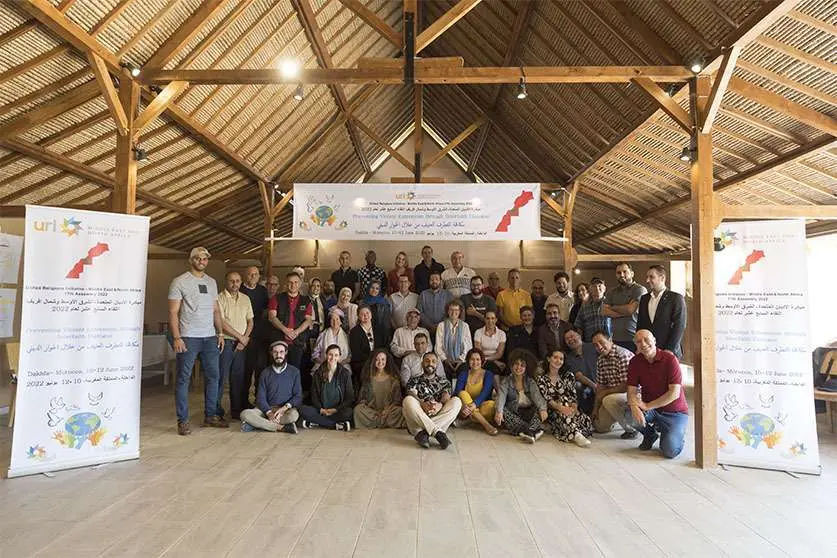Dakhla and coexistence in Morocco

In these turbulent times in the world, with a lot of accumulated tension and with political leaders put to the test by the Russian aggressor in Ukraine, it is a great relief that people from different cultures, different religions and different countries are able to coexist, debate, analyse, share ideas and experiences in a calm and tolerant manner. Dakhla is the capital of the so-called southern provinces of Morocco and was the place chosen by URI MENA, the United Religions Initiative - Middle East and North Africa, to bring together more than 30 people from Israel, Palestine, Jordan, Yemen, Poland, Bulgaria, Bosnia, Iraqi Kurdistan, the United States, Morocco, Tunisia and Egypt for an Annual Assembly dedicated to the prevention of violent extremism through inter-religious dialogue. Among the most relevant conclusions was that Morocco is an example of coexistence between Muslims and Jews.
The director of the John Paul II Centre for Interreligious Dialogue and member of the URI, Peter Dziedric, who has devoted himself to the cultural study of the Islamic world, points out that Morocco is taking a transcendental role in the fight against terrorism through religious education in a peaceful way and explains how the Kingdom is being a symbol of coexistence between Islamic and Jewish culture.
Coexistence between Muslims and Jews
Officially, Morocco established diplomatic relations with Israel in 2020, with the boost provided by Donald Trump's famous tweet recognising Moroccan sovereignty in the Sahara. But the good relations between Moroccans and Israelis, between Alawite Sufis and Jews, date back many years, and could be seen in King Mohammed VI's decision to restore several synagogues in Morocco and in the influence of prominent members of the Jewish and Sephardic community such as the King's current advisor, André Azoulay.
Dziedric explains that Morocco's spiritual and religious culture with respect to Judaism represents an improvement in relations with Israel and the Jewish diaspora, along with the promotion of interculturalism, which makes it possible to work towards preventing extremism and jihadism and to benefit tourism. Defining Sufi culture away from violence in Morocco represents a very interesting path in Islam to achieve peace and involve young people by creating a culture of non-violence. He concludes that Morocco is probably the leader in preserving and promoting the Sufi narrative in Islam to combat extremism.
Abraham Accords
Today, Morocco has fully joined the extraordinary dynamic of understanding, collaboration and stability that emerged after the signing of the Abraham Accords between Israel and the United Arab Emirates and Bahrain. A possible understanding between Arabs and Israelis, which could soon be joined by Saudi Arabia, and which goes far beyond the objective of confronting the aggressive expansionism of the Iranian ayatollahs and is proving extremely useful for the citizens and societies of these countries because the implementation of the points of the agreements has a positive effect on all sectors. From financial and banking collaboration, scientific research, education and health, cultural, academic and university exchanges, tourism, new technologies and digitalisation and many other aspects that have a positive influence on the daily lives of the citizens of these countries. The Abraham Accords offer such useful possibilities for coexistence and understanding as inter-religious dialogue, political stability and broad cooperation on security and the fight against terrorism and organised crime.
Palestinians and Israelis
In the framework of the URI MENA Annual Assembly, the stories of people who have been scourged by the scourge of terrorism with the capacity to forgive and to face their new and burdened lives were striking both for the vital tone of the interventions and for the philosophy of overcoming the deep wounds caused by the explosion of a bomb that mows down the legs of a son, or the cowardly knifings of a fanatic abducted by terrorist doctrinaires who manipulate weak and manipulable wills for their own benefit. In this context, the dialogue between a Palestinian and an Israeli arouses enormous interest because of the ability to exchange very different points of view, but with a tone of respect and conciliatory spirit that many of us would wish for political leaders. It is an example of how the key to tackling the essential decline in violent and terrorist extremism is the education of children, both within the family and in schools. This is a challenge for any self-respecting society that is aware of the enormous need to cultivate principles and values in peace, freedom, democracy and with unwavering respect for the rule of law and its laws.

